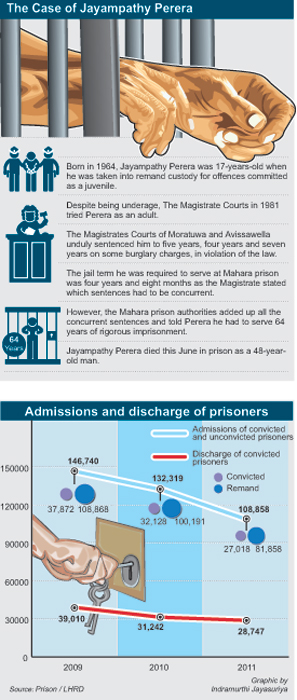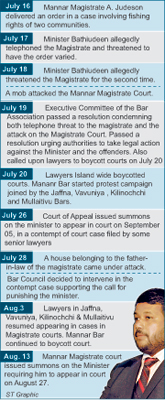News
Prisoner rights violated, charge HR lawyers
Imposition of unlawful sentences by some magistrates and procedural anomalies in the criminal justice system, are violating the rights of accused, claimed human rights (HR) lawyers.
![]()
Articles 12 and 13 of the Constitution guarantee Sri Lankans equal protection of the law and freedom from arbitrary arrest, detention, punishment and prohibition of retroactive penal legislation. However, HR lawyers point out flagrant violations of fundamental rights by the very institutions sworn to uphold the law.
Magistrates imposing undue sentences
Sections 14 and 16 of the Code of Criminal Procedure Act (CCPA) states that a magistrate can only impose a maximum sentence of two years imprisonment for a charge, and total four years maximum for several charges, and an additional two years under the Prevention of Crimes Ordinance (PCO). However, there are many cases unearthed through prison visits, where magistrates have imposed unduly long prison sentences, said Kalyananda Thiranagama, senior lawyer and Executive Director of the Lawyers for Human Rights and Development.
“Any imprisonment sentence exceeding four years is beyond the jurisdiction of a magistrate, and has no validity in law,” Mr. Thiranagama said. “A prisoner is not bound to serve such an illegal sentence.”
Mahara Prison inmate Loku Vitanage Ratnapala was given an 84-year prison sentence in 1988, by the Morawaka magistrate. In one case, court imposed an aggregated (total) sentence of 15 years on Ratnapala and aggregate sentences of 34.5 years each for two other cases. Warrants of Commitment issued by the magistrate do not indicate that sentences were imposed under PCO. Under the CCPA, a magistrate could have only imposed 12 years maximum for all three cases, Mr. Thiranagama said.
“This man is forced to serve 72 years, illegally imposed by the Morawaka magistrate, whereas, he should have been released in May 2010, after serving the legal sentence, but will remain in custody until 2053,” he added.
Because of his long incarceration, Ratnapala has lost his family. His son visited him for the first and last time in 2003, and no relatives have come to see him since.
Similarly, in 1981 the Moratuwa magistrate imposed five and four years each on four counts of burglary on 17-year-old Rupasinghe Arachchige Jayampathy Perera. The Avissawella magistrate imposed a seven-year sentence on him for another burglary. In 2004, the Kurunegala magistrate imposed an aggregated sentence of six years on Sainudeen Mohomed Rafeek. In 2005, the Minuwangoda magistrate imposed an aggregated sentence of 14 years on Kotte Hewage Ruwan de Silva, a blind prisoner. In 2007, the Embilipitiya magistrate gave Hettige Udaya Sampath aggregated sentences of five years each on three cases of burglary and theft of goods.
Mr. Thiranagama said judicial authorities should immediately rectify such undue sentences. Judicial Services Commission Secretary Manjula Thilakaratne told the Sunday Times that he couldn’t comment on the matter without examining the records with approval of the Commission. Law Commission Secretary Ananda Amaraweera said he was not aware of such incidents.
Attorney General Palitha Fernando said if a magistrate had given sentences beyond his/her jurisdiction, the aggrieved persons could appeal to the High Court.
“Then, State counsel in the High Court will point out if the sentence is illegal,” he said.Appeals to the High Court must be filed within 14 days. Fundamental rights petitions filed at the Supreme Court for these cases by Mr. Thiranagama were dismissed.
“How can they appeal in High Court in that time period, when they are not represented by a lawyer?” Mr. Thiranagama asked. “Before they appeal, they should know this sentence is illegal. How can a poor man know if it’s illegal or not?”
Lawyers are not appointed in magistrate courts, if the accused cannot afford one, when charges are brought by the police.
“Most of such cases would not have happened, if there had been legal representation,” said retired Supreme Court Justice Nissanka Udalagama. “If a lawyer had been there, they can tell the magistrate that they can’t do this.”
“Prisoners can get legal aid only upon request, and with a letter from the Grama Sevaka stating the income of the accused is below Rs 12,000,” said Legal Aid Commission Chairman S.S. Wijeratne.
“Even with proper legal representation, lack of standards may be contributing to undue sentencing,” said senior lawyer K.D.C. Kumarage.
“Earlier, when accused were not defended, they could petition higher authorities, but not now,” he added. “Also, different courts interpret the law differently, hence there should be better standards.”
Prisoners serving longer sentences not ordered by a judge
“When there are multiple charges against an accused, judges sometimes impose multiple sentences as concurrent sentences, to serve all at once. However, prison authorities enforce concurrent sentences as consecutive sentences, where sentences are served one after the other,” Mr. Thiranagama said.
For example, a prisoner facing 10 charges, pleads guilty on advice of counsel, hoping for a lenient sentence and not wanting to spend years in remand custody, unable to furnish bail. The judge accepts the plea bargain and imposes a two-year sentence each for the 10 counts to be served concurrently. The court, the counsel and the prisoner are of the view that the sentence for all counts is two years. However, in prison, the authorities add up the charges to be served as a consecutive sentence and inform the prisoner the sentence is for 20 years.
“Many judges, lawyers and prisoners may not be aware that concurrent sentences imposed by courts are enforced as consecutive sentences by prison authorities, compelling helpless prisoners to serve a sentence several times longer than ordered by the judge,” Mr. Thiranagama said.
This was the case of Jayampathy Perera, convicted on multiple counts and given concurrent sentences. The judge states on Perera’s Warrants of Commitments, “the case sentences must be carried out concurrently.” The total sentence ordered by the Court was for four years and eight months, but the prison authorities aggregated all the charges as a consecutive sentence and informed Perera he had to serve 64 years of rigorous imprisonment.
Mr. Thiranagama said prison authorities have adopted this practice based on a 1988 circular by the AG, of his interpretation of Section 300 of CCPA, following a Court of Appeal judgment. The then AG wrote concurrent sentences by courts maybe “disregarded” and should be imposed as consecutive sentences for separate cases. This interpretation is still maintained by the present AG.

“If a magistrate orders concurrent sentences in one case, the prison authorities cannot impose them as consecutive sentences,” Mr. Fernando said. “However, if there are several cases, the sentences must be carried out as consecutive sentences under Section 300. A magistrate cannot impose concurrent sentences in two cases.”
Mr. Thiranagama opines the practice must be amended in light of its actual application. “In my opinion, the AG’s interpretation is wrong,” he said. “The law should be rectified, otherwise it amounts to fraud on the prisoner and disregards judicial discretion, which is for the judge to decide how long an accused should serve. If prison authorities can disregard judicial discretion, it would amount to usurpation of judicial discretion by the executive. India had a similar law and they amended it about 50 years ago.”
Juveniles tried as adults
Jayampathy Perera was charged as an adult when he was 17, for offenses committed as a child of 12, in violation of the Children and Young Persons Ordinance and the Youthful Offenders (Training Schools) Ordinance.
“There are separate laws to deal with children and young people,” Mr. Thiranagama said. “They are not sentenced to jail. Those under 16 are sent to children’s homes or certified schools. Those between 16 and 22 are sent to a Training School for Youthful Offenders at Ambepussa. Young offenders should not be in adult prisons.”
Regardless, two young offenders, Adrian Janz and Ganesh Kumar, charged in 2010, when they were under 18, are languishing at Pallansena rehabilitation facility. Janz and Kumar were charged on multiple counts of theft and house breaking and pleaded guilty on direction of the police, Mr. Thiranagama said.
The Wattala magistrate sentenced them to Pallansena, an adult detention facility. Under Youthful Offenders Ordinance, the maximum term youthful offenders can be detained for is three years. But the police have calculated Janz’s sentence to be 16 years and Kumar’s to be 13 years without remission.
Mr. Thiranagama said this may have occurred because the judge was unaware that the training school at Pallansena was moved to Ambepussa in 2009.
“Confusion may have also contributed,” he said. “And judges may have thought prison authorities comply with the law that maximum sentence at a training school is three years for youthful offenders.”
Mr. Kumarage said such undue sentences indicate negligence and violations of the Rights of the Child.
“Jurisprudence applies in our system for protecting rights of all people,” he said. “Now things have changed, even the blindfold on lady justice is taken away and judges are prejudiced.”
The Sunday Times could not reach the Commissioner General of Prisons nor the Inspector General of Police for their comments.
New laws to limit judges’ discretion: Minister
A Sentencing Policy Law, to be introduced shortly, will limit the discretion afforded to judges, Justice Minister Rauff Hakeem said yesterday.
“There must be a rationale to the way sentencing is made,” he told the Sunday Times.He said that former Secretary to the Ministry Suhada Gamlath and now Additional Solicitor General, has had detailed discussions on the subject with legal experts from Australia.
“We propose to have a workshop for the High Court Judges,” he said. Initially, this will look at “how best we could fine tune the proposed legislation. Thereafter, we will refer it to the Law Commission for study,” he added.
Follow @timesonlinelk
comments powered by Disqus























